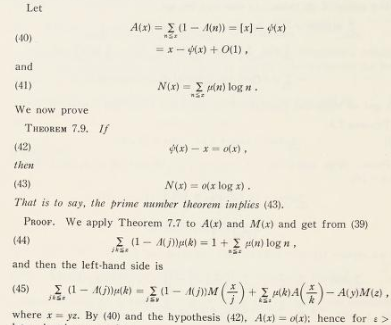The identity contained in the last two displayed equations in the following passage (from page 110 in Ayoub's An Introduction to the Analytic Theory of Numbers, 1963) gives us right away a simple proof that the prime number theorem implies $M(x) = o(x)$. (Here $M(x)$ is the Mertens function $\sum_{n\leq x} \mu(n)$.) What is more, it's really useful in deriving explicit bounds on how fast $M(x)/x$ goes to $0$; until now, there was nothing better - the 'natural' analytic approach to bounding $M(x)$ is numerically hopeless. (More about that soon, but that's another matter.)
I find it unlikely that the identity appeared in Ayoub's textbook for the first time: it's a textbook, and not a particularly early one. However, the first proof that PNT implies $M(x)=o(x)$ (in Landau's thesis; in fact, it's basically Landau's thesis, together with PNT implying $\sum_n \mu(n)/n = o(1)$) seems rather more roundabout, though maybe it's just prolixly written. Any idea of where the identity can first be found?
Rules: full credit for anything the same as the above with different notation; high partial credit for finding the first occurence of $$\sum_{n\leq x} \mu(n) \log n = - 1 - \sum_{m\leq x} \mu(m) \left(\psi\left(\frac{x}{m}\right) - \left\lfloor \frac{x}{m}\right\rfloor\right),$$ which is enough to prove $\text{PNT}\Rightarrow M(x) = 0$. (Reason: $(\log x) \sum_{n\leq x} \mu = \sum_{n\leq x}\mu(n) \log n + \sum_{n\leq x} \mu(n) \log \frac{x}{n}$, and $\sum_{n\leq x} \log \frac{x}{n}\leq x$.)
Note: found the citation to Ayoub in Schoenfeld's 1969 paper on explicit bounds on $M(x)$.

